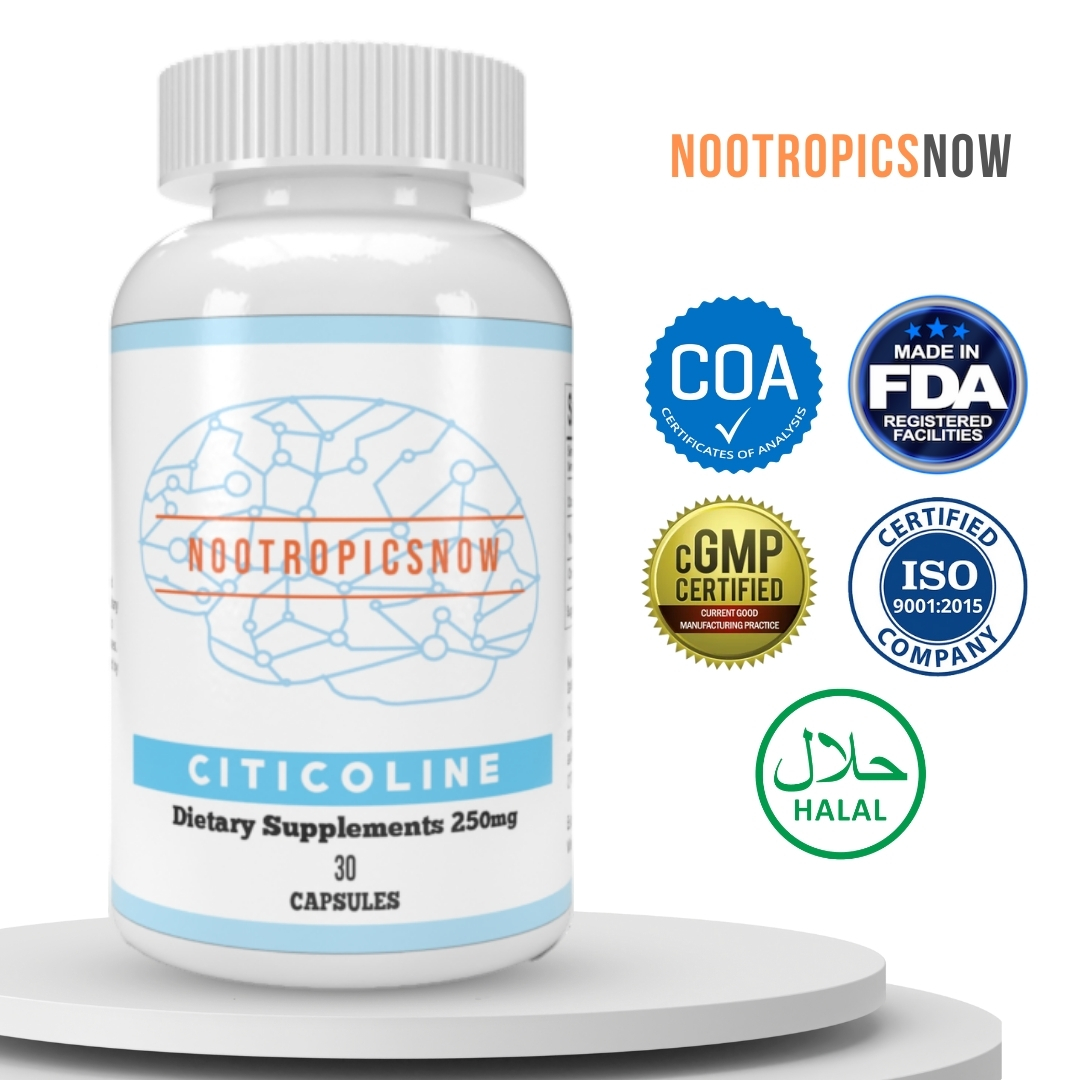Choline Nootropics: Benefits & Best Sources

`markdown
Nootropics Choline: A Comprehensive Guide to Cognitive Enhancement
Choline, a vital nutrient often overshadowed by other nootropics, plays a pivotal role in cognitive function. This comprehensive guide explores various aspects of choline, including its forms, benefits, and optimal usage within nootropic stacks. Our goal is to provide detailed insights into how choline can enhance cognitive performance and support overall brain health.
Understanding Choline: The Foundation of Cognitive Enhancement
Choline is an essential nutrient crucial for several physiological processes. It is a water-soluble compound and, while often associated with B vitamins, it is technically neither a vitamin nor a mineral. The body can produce choline in small amounts. However, dietary intake or supplementation is often necessary to meet daily requirements and support optimal brain function.
Why is Choline Important?
Choline plays a vital role in:
Dietary Sources of Choline
Ensuring sufficient choline intake through diet is crucial. Here are some excellent sources:
For individuals struggling to obtain enough choline through diet alone, supplementation becomes a valuable option.
Forms of Choline: Choosing the Right Supplement
Different forms of choline offer varying degrees of bioavailability and cognitive benefits. Understanding these differences is essential for selecting the most appropriate supplement for your needs.
Choline Bitartrate
Choline Bitartrate is a common and affordable choline supplement. It consists of choline combined with tartaric acid, which enhances its absorption. However, Choline Bitartrate has lower bioavailability and does not readily cross the blood-brain barrier compared to other forms. Therefore, it primarily supports peripheral choline functions rather than directly impacting brain acetylcholine levels to the same extent as other forms.
Choline Chloride
Choline Chloride is another inexpensive form of choline. It’s highly water-soluble and easily absorbed in the gut. However, like Choline Bitartrate, it has limited ability to cross the blood-brain barrier. While it supports overall choline levels, its impact on cognitive functions may be less pronounced compared to other specialized forms of choline.
CDP-Choline (Citicoline)
CDP-Choline, also known as Citicoline, is a more potent form of choline. It is a naturally occurring chemical in the body and is crucial for brain health. CDP-Choline not only provides choline for acetylcholine synthesis but also supplies cytidine, which converts to uridine. Uridine is essential for the synthesis of phosphatidylcholine, a major component of brain cell membranes. CDP-Choline readily crosses the blood-brain barrier, making it more effective at enhancing cognitive functions.
`markdown

View Product
`
Alpha-GPC (Alpha-Glycerylphosphorylcholine)
Alpha-GPC is another highly bioavailable form of choline. It efficiently crosses the blood-brain barrier and is rapidly converted into acetylcholine in the brain. Alpha-GPC is particularly effective at enhancing cognitive functions, including memory, focus, and mental clarity. It also supports growth hormone release, potentially benefiting athletes and fitness enthusiasts.
`markdown

View Product
`
Phosphatidylcholine
Phosphatidylcholine is a phospholipid that contains choline and is a major component of cell membranes. It is found in foods like soy lecithin and sunflower lecithin. While not as potent as CDP-Choline or Alpha-GPC, Phosphatidylcholine contributes to overall choline levels and supports cell membrane health.
Choosing the appropriate form of choline depends on individual needs, budget, and desired cognitive effects. CDP-Choline and Alpha-GPC are generally preferred for their high bioavailability and pronounced cognitive benefits.
The Benefits of Choline for Cognitive Enhancement
Choline offers a wide range of cognitive benefits, making it a valuable addition to any nootropic stack.
Enhanced Memory and Learning
Choline is essential for acetylcholine synthesis, a neurotransmitter vital for memory and learning. By increasing acetylcholine levels, choline supplements can improve memory formation, retention, and recall. This benefit is particularly valuable for students, professionals, and individuals experiencing age-related cognitive decline.
Improved Focus and Attention
Acetylcholine also plays a crucial role in attention and focus. Choline supplementation can enhance concentration, reduce mental fatigue, and improve overall cognitive performance during demanding tasks. This can lead to increased productivity and efficiency in both academic and professional settings.
Neuroprotection
Choline supports the structural integrity of brain cell membranes through its role in phosphatidylcholine synthesis. By maintaining healthy cell membranes, choline protects brain cells from damage and promotes long-term brain health. This neuroprotective effect may help prevent age-related cognitive decline and neurodegenerative diseases.
Mood Regulation
Acetylcholine influences the activity of other neurotransmitters, including dopamine and serotonin, which play a role in mood regulation. Choline supplementation may help improve mood, reduce anxiety, and promote a sense of well-being.
Support for Brain Development
Choline is particularly important during pregnancy and early childhood for optimal brain development. Adequate choline intake during these critical periods supports the formation of neural pathways, enhances cognitive function, and reduces the risk of neurodevelopmental disorders.
Benefits for Physical Performance
Alpha-GPC, a specific form of choline, can enhance physical performance by supporting growth hormone release. This can lead to increased muscle strength, power, and endurance, making it a valuable supplement for athletes and fitness enthusiasts.
Choline and Nootropic Stacks: Synergistic Effects
Choline works synergistically with other nootropics to enhance their cognitive effects and prevent potential side effects. It is often combined with racetams, such as piracetam, aniracetam, and oxiracetam, to maximize their cognitive benefits.
Choline and Racetams
Racetams are a class of nootropics known for their ability to enhance cognitive function. They work by modulating neurotransmitter receptors in the brain, including acetylcholine receptors. However, racetams can deplete acetylcholine levels, leading to headaches and other side effects. Combining choline with racetams provides the necessary precursor for acetylcholine synthesis, preventing these side effects and enhancing the cognitive benefits of both compounds.
Choline and Other Nootropics
Choline can also be combined with other nootropics, such as:
`markdown

View Product
`
Considerations When Stacking Choline
Potential Side Effects and Precautions
While generally safe, choline supplementation can cause side effects in some individuals, particularly at high doses.
Common Side Effects
Precautions
Dosage Recommendations
The recommended daily intake of choline varies depending on age, sex, and individual needs.
For nootropic purposes, dosages may range from 250 mg to 2000 mg per day, depending on the form of choline and individual tolerance.
It is crucial to start with a low dose and gradually increase it while monitoring for any potential side effects. Consulting with a healthcare professional or a knowledgeable nootropics expert can help determine the optimal dosage for individual needs.
Buying Choline Supplements: What to Look For
When purchasing choline supplements, consider the following factors:
Reputable Brands
Some reputable brands that offer high-quality choline supplements include:
Conclusion: Maximizing Cognitive Potential with Choline
Choline is a vital nutrient that plays a crucial role in cognitive function and overall brain health. By understanding the benefits, forms, and optimal usage of choline, individuals can effectively enhance their cognitive performance and support long-term brain health. Whether obtained through diet or supplementation, choline is a valuable addition to any nootropic stack, working synergistically with other compounds to maximize cognitive potential. Remember to start with a low dose, monitor for side effects, and consult with a healthcare professional or nootropics expert to determine the best approach for individual needs. By incorporating choline into a comprehensive cognitive enhancement strategy, individuals can unlock their full cognitive potential and achieve optimal brain health.
`
Nootropics: The Role of Choline in Cognitive Enhancement
Choline is a crucial nutrient playing a significant role in cognitive function and overall brain health. While not a vitamin or a mineral, choline is a water-soluble nutrient related to the B-Vitamin group. Let’s delve into a comprehensive overview of choline and its various forms, underscoring its importance in nootropic stacks.
Understanding Choline: The Building Block for Brainpower
Definition and Importance: Choline is recognized as an essential nutrient. This means that the body cannot produce sufficient amounts on its own. Consequently, we need to obtain it through our diet or supplements. Furthermore, choline is vital for various bodily functions. These encompass liver function, normal brain function and development, nerve function, muscle movement, cellular energy, and metabolism.
Sources of Choline: Thankfully, choline is naturally abundant in various food sources. Eggs, liver, beef, and salmon are excellent sources. Furthermore, cauliflower, Brussels sprouts, and even breast milk contain choline. Eggs are noteworthy for their high choline content. They are often touted as “brain food”. That is because they supply substantial amounts of choline.
Different Forms of Choline: Choosing the Right One for Your Needs
The effectiveness of choline supplements varies significantly depending on their form. Some common forms include choline bitartrate, CDP-choline (citicoline), alpha-GPC, and phosphatidylcholine. Each of these forms has unique properties influencing its absorption, bioavailability, and impact on cognitive function.
1. Choline Bitartrate: A Cost-Effective Option
Composition and Bioavailability: Choline bitartrate consists of choline combined with tartaric acid. The combination enhances its bioavailability and effectiveness. It contains approximately 40% choline by weight. That makes it a relatively economical choline source. However, choline bitartrate’s ability to cross the blood-brain barrier is limited. Consequently, its nootropic benefits may be less pronounced compared to other choline forms such as Alpha-GPC or CDP-choline.
2. CDP-Choline (Citicoline): A Multifaceted Cognitive Enhancer
Composition and Benefits: CDP-Choline, known as citicoline, is a brain-enhancing nutrient. It supplies the necessary raw materials and energy that the brain needs to function. It also provides multi-tasking brain bioactivities. For instance, it acts as a brain energizer, neuro-regenerative agent, and cerebral circulation optimizer. CDP-choline has about 18% choline by weight. Still, it is efficient in elevating brain phosphatidylcholine levels. This elevation is crucial for cell membrane synthesis and neurotransmitter production.
3. Alpha-GPC (Alpha-Glycerylphosphorylcholine): A Potent Choline Source
Composition and Benefits: Alpha-GPC is a highly bioavailable form of choline. This allows it to easily cross the blood-brain barrier. Once in the brain, Alpha-GPC increases acetylcholine production. Consequently, users often report improved memory, focus, and cognitive clarity. In addition, Alpha-GPC may have growth hormone-releasing effects, potentially benefiting athletes and fitness enthusiasts. It has approximately 40% choline by weight, but its efficiency in delivering choline to the brain makes it a superior choice for nootropic purposes.
4. Phosphatidylcholine: A Naturally Occurring Form
Composition and Benefits: Phosphatidylcholine is a phospholipid—a type of fat molecule vital for cell membrane structure and function. It is naturally present in foods like soy lecithin and sunflower lecithin. While not as potent as Alpha-GPC or CDP-choline, phosphatidylcholine provides choline along with other beneficial fatty acids. This supports overall brain health and cognitive function. Furthermore, it contributes to the structure and flexibility of brain cell membranes.
The Role of Choline in Neurotransmitter Production: Acetylcholine and Beyond
Choline’s significance in neurotransmitter production cannot be overstated. It is primarily essential for the synthesis of acetylcholine. This key neurotransmitter is involved in processing, problem-solving, decision-making, and memory. In particular, acetylcholine is involved in the cognitive processes. Low levels of acetylcholine are associated with Alzheimer’s disease. Problems with memory, attention, and focus are also related to the neurotransmitter’s deficiency. Choline supplements like choline bitartrate, CDP-choline, and Alpha-GPC increase acetylcholine levels. Consequently, they help to enhance cognitive functions.
Acetylcholine and Cognitive Function: Acetylcholine plays a crucial role in numerous cognitive functions. Some of those functions include attention, learning, and memory. By ensuring optimal levels of acetylcholine through choline supplementation, individuals can support their cognitive performance. They will also mitigate potential cognitive decline. Acetylcholine aids in neuron communication. By doing so, it supports cognitive function.
Other Neurotransmitter Interactions: While choline primarily influences acetylcholine production, it can indirectly affect other neurotransmitter systems. For example, increased acetylcholine can modulate dopamine release. This influences mood, motivation, and focus. Therefore, maintaining adequate choline levels can benefit overall neurotransmitter balance.
Clinical Research and Benefits: Backing Up the Claims with Science
The benefits of choline are supported by extensive clinical research, demonstrating its effectiveness in various cognitive and neurological areas. Several studies have highlighted the role of choline in cognitive enhancement and neuroprotection. Here’s a look at some key findings:
1. Cognitive Decline and Neuroprotection: Combating Age-Related Cognitive Decline
Studies suggest that supplemental choline can stop or reverse brain degeneration. This degeneration is associated with Alzheimer’s disease and other cognitive disorders. In particular, benefits are observed in the early to mid-stages of the disease.
2. Neurotransmitter Regulation: Balancing Brain Chemistry
CDP-choline impacts dopamine levels indirectly. It supports the cholinergic system. The system, in turn, can affect dopamine production and release. This interaction can improve mood, motivation, and cognitive processes.
3. Brain Health and Function: Supporting Optimal Brain Performance
Choline supplements improve memory, mood, and mental energy. They work well with phospholipids, supporting brain cell health and function. This makes them valuable for brain repair, regeneration, and plasticity.
Combining Choline with Other Nootropics: Synergistic Effects for Enhanced Cognition
Choline is frequently incorporated into nootropic stacks to synergize with other cognitive enhancers. Some nootropics, such as racetams (e.g., piracetam, aniracetam), increase acetylcholine utilization in the brain. Combining choline with these nootropics can amplify their effects. It prevents acetylcholine depletion, potentially causing headaches, a common side effect.
Popular Nootropic Stacks with Choline:
Dosage and Safety Considerations: Finding the Right Balance for You
Determining the appropriate choline dosage is essential for maximizing benefits and minimizing potential side effects. The recommended daily intake varies based on individual factors. This includes age, gender, and overall health status. Generally, dosages range from 250 mg to 1000 mg per day, depending on the form of choline used and the individual’s tolerance.
Recommended Dosages:
Potential Side Effects: Common side effects of choline supplementation include nausea, diarrhea, and a fishy body odor. Beginning with a low dose and gradually increasing it can help minimize these side effects. In rare cases, high doses of choline may lead to more severe adverse effects.
Precautions and Contraindications: Individuals with certain medical conditions, such as trimethylaminuria (TMAU), should exercise caution when taking choline supplements. It is essential to consult with a healthcare professional before starting choline supplementation, especially if you have any pre-existing health issues.
Dietary Strategies to Increase Choline Intake: Food First
While supplements can be beneficial, prioritizing dietary sources of choline is an excellent way to ensure adequate intake. Incorporating choline-rich foods into your diet can support overall health and cognitive function.
Top Choline-Rich Foods:
The Future of Choline Research: What Lies Ahead?
Ongoing research continues to explore the diverse benefits of choline. Areas of focus include its role in preventing neurodegenerative diseases, improving athletic performance, and supporting mental health. Future studies are expected to provide deeper insights into the optimal use of choline for cognitive enhancement and overall well-being.
Emerging Areas of Research:
Conclusion: Optimizing Cognitive Function with Choline
Choline is vital in nootropic stacks. It maintains clear communication between neurons, supporting overall brain health. Various forms, including choline bitartrate, CDP-choline, Alpha-GPC, and phosphatidylcholine, offer different benefits and bioavailability profiles. Understanding the role of choline in neurotransmitter production and its clinical benefits can help individuals make informed decisions. In doing so, they can wisely incorporate choline supplements into their cognitive enhancement regimen.

